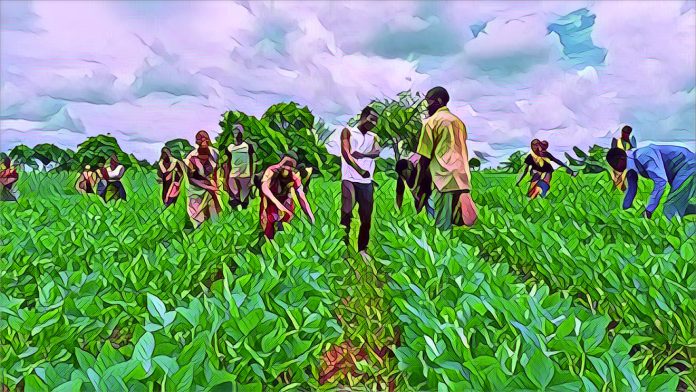In a significant move to bolster food production, Nigeria’s Minister of Agriculture and Food Security, Abubakar Kyari, announced the commencement of the second phase of the dry/wet season farming intervention. This initiative, revealed during a meeting with Jigawa State Governor Umar Namadi in Abuja, aligns with President Bola Ahmed Tinubu’s mandate to ensure national food security.
Kyari emphasized the government’s commitment to increasing food production to mitigate food inflation, currently a primary driver of overall inflation in the country. “Our focus is on massive production of staple crops using advanced technology and mechanisation,” Kyari stated, signalling a shift towards more efficient agricultural practices.
The Minister acknowledged the challenges of high food prices, particularly rice, attributing these to market dynamics of supply and demand. To address this, the Ministry has initiated efforts to increase rice availability and stabilise prices in the coming weeks.
Reflecting on the 2023/2024 dry season farming launched last November, Kyari identified key challenges hindering food production. Issues such as round-tripping in collaboration with agro-dealers and poor validation of farmers’ data were highlighted as critical areas needing attention to ensure the success of agricultural initiatives.
The Federal Ministry of Agriculture and Food Security is adopting rigorous measures to address these challenges in the upcoming farming season. Kyari assured that transparent distribution and targeting genuine farmers for crops like rice, maize, and cassava are top priorities. Collaborative efforts with state governments, local authorities, NGOs, and relevant agencies are deemed essential for achieving these goals.
Governor Namadi lauded the Federal Government’s support, which enabled Jigawa State to cultivate over 36,000 hectares during the wheat dry season. He revealed ongoing efforts to update the farmers’ register in the state, aiming for a comprehensive database for rice farmers by the time dry season farming commences. “We are also introducing measures like issuing certificates with farmers’ photos and farmland locations to ensure accuracy,” he added.
The state has employed over 1,400 extension workers to guide farming activities, reflecting a concerted effort to enhance agricultural productivity and efficiency.
This initiative represents a critical step in Nigeria’s journey towards food self-sufficiency. By addressing both the macro and micro aspects of agricultural production, the government is laying a foundation for sustainable growth in this sector. These efforts are not only expected to reduce Nigeria’s dependence on food imports but also to provide a buffer against global food market volatility.
The wet season farming strategy underscores the government’s proactive approach to tackling the twin challenges of food insecurity and inflation. By focusing on key staples and employing a mix of technology, policy intervention, and grassroots involvement, Nigeria is positioning itself to become a leader in African agricultural reform.
As Nigeria advances with these agricultural reforms, the role of state and local governments becomes increasingly pivotal. Their cooperation and alignment with federal initiatives are crucial for the successful implementation and scalability of these programs. This integrated approach is expected to yield dividends in the form of increased food production, job creation, and overall economic stability.
The Federal Government’s commitment to enhancing wet season farming is a promising development for Nigeria’s agricultural sector. It represents a strategic move towards ensuring food security, stabilising prices, and fostering economic growth. As these initiatives gain momentum, the potential to significantly transform the agricultural landscape of Nigeria, driving the nation towards greater self-reliance and prosperity.
This renewed focus on agriculture is not just a strategy for economic stabilization, but also a visionary step towards empowering rural communities, who are often the backbone of Nigeria’s agricultural sector. By investing in these communities and improving access to modern farming techniques and resources, the government is enabling a more inclusive and sustainable growth model.
Moreover, the integration of technology and data management in farming practices, as highlighted by both Minister Kyari and Governor Namadi, is a progressive move. The implementation of a comprehensive farmer database and the use of digital tools for farm management are set to revolutionize the agricultural sector, making it more efficient and productive.
This approach also aligns with global trends towards sustainable and technology-driven agriculture, positioning Nigeria as a forward-thinking player in the international arena. The potential benefits extend beyond food security, encompassing environmental sustainability, economic diversification, and enhanced global competitiveness.
As Nigeria embarks on this ambitious journey, the collaboration between various levels of government and the involvement of local communities and farmers will be key. The success of these initiatives will depend on their ability to adapt to local conditions and address the specific needs of Nigerian farmers.
The Federal Government’s initiative to boost food production through enhanced wet season farming is a beacon of hope for Nigeria’s future. It promises not only to address immediate concerns of food inflation and security but also to pave the way for a more prosperous and self-sufficient Nigeria. This strategic move has the potential to create a ripple effect across the economy, fostering overall growth and development.
With this renewed emphasis on agricultural development, Nigeria stands at the cusp of a major transformation. The potential impact of these reforms is vast, offering a blueprint for other nations facing similar challenges. As the country moves forward with its ambitious plans, the world watches, anticipating the positive changes that these efforts will bring to Nigeria and its people.



